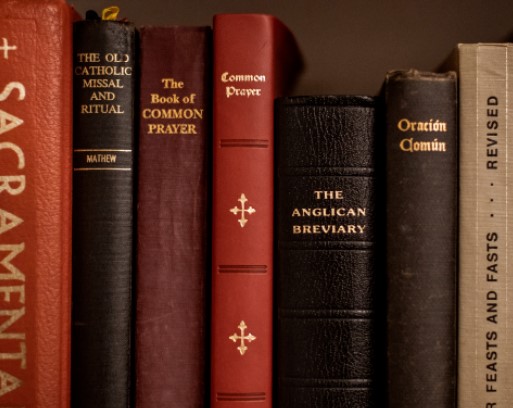Recently, a parishioner requested a book table which got me thinking about what to include.
Here’s what I decided to buy for our Parish Book Table:
Knowing God, JI Packer (Affiliate link)
Outline of an Anglican Life, Tarsitano
Signed Sealed and Delivered, Sutton
Monkhood of All Believers, Peters (Affiliate link)
Although the institution of monasticism has existed in the Christian church since the first century, it is often misunderstood. Greg Peters, an expert in monastic studies, reintroduces historic monasticism to the Protestant church, articulating a monastic spirituality for all believers.
As Peters explains, what we have known as monasticism for the past 1,500 years is actually a modified version of the earliest monastic life, which was not necessarily characterized by poverty, chastity, and obedience but rather by one’s single-minded focus on God–a single-mindedness rooted in one’s baptismal vows and the priesthood of all believers. Peters argues that all monks are Christians, but all Christians are also monks. To be a monk, one must first and foremost be singled-minded toward God. This book presents a theology of monasticism for the whole church, offering a vision of Christian spirituality that brings together important elements of history and practice. The author connects monasticism to movements in contemporary spiritual formation, helping readers understand how monastic practices can be a resource for exploring a robust spiritual life.
Holiness, JC Ryle (Affiliate link)
On the Incarnation, St. Athanasius (Affiliate link)
By any standard, this is a classic of Christian theology. Composed by St Athanasius in the fourth century, it expounds with simplicity the theological vision defended at the councils of Nicaea and Constantinople: that the Son of God himself became “fully human, so that we might become god.” Its influence on all Christian theology thereafter, East and West, ensures its place as one of the few “must read” books for all who want to know more about the Christian faith.
Simply Christian, NT Wright (Affiliate link)
For two thousand years, Christianity has claimed to answer the mystery of human existence. Renowned biblical scholar and Anglican bishop N. T. Wright—the award-winning author Newsweek hails as “the world’s leading New Testament scholar”—argues that the Christian faith still holds the answers today.
Like C. S. Lewis did in his classic Mere Christianity, Wright makes the case for Christian faith for modern readers, whether you are a believer, an agnostic, schooled in a different spiritual tradition, or are a skeptical atheist suspicious of organized religion. Using clear, simple language to convey a profound message, he walks you through the Christian faith step-by-step and question by question, and reveals how basic inquiries such as Why is justice fair? Why are so many people pursuing spirituality? Why do we crave relationship? And why is beauty so beautiful? take us into the mystery of God and his plan for us and leave believers with a reason for renewed faith.
Abolition of Man, Lewis (Affiliate link)
In the classic The Abolition of Man, C.S. Lewis, the most important Christian writer of the 20th century, sets out to persuade his audience of the importance and relevance of universal values such as courage and honor in contemporary society. Both astonishing and prophetic, The Abolition of Man is one of the most debated of Lewis’s extraordinary works. National Review chose it as number seven on their “100 Best Nonfiction Books of the Twentieth Century.”
Apology of the Church of England, Jewel (Affiliate link)
John Jewel (1522-1571), Bishop of Salisbury, stands as one of the leading architects and perhaps the staunchest defender of the Protestant Church of England. Writing in 1562 when the Elizabethan church was yet young and fragile, and menaced by Catholic foes at home and abroad, Jewel proudly proclaimed the independence of the English church from Roman rule, and the deep catholicity of its reformation.Appealing throughout to the testimonies of the Church Fathers, Jewel made a powerful case that the Protestants were not heretics or innovators, but genuine reformers, restoring the church to the purity of apostolic practice and proclaiming anew the “faith once delivered to the saints.” Along the way, he refutes common misunderstandings or caricatures of Protestant teaching, and takes the offensive against what he sees as the tyrannical power of the medieval papacy.The result is a ringing defense of the English Reformation that became an instant classic, integral to the theological self-understanding of the Church of England and to the Anglican Communion that later developed from it. It remains essential reading today for Anglicans—or any English-speaking Protestants—seeking to better understand and articulate their relation to the church’s biblical roots, catholic tradition, and sixteenth-century renewal.

Leave a ReplyCancel reply